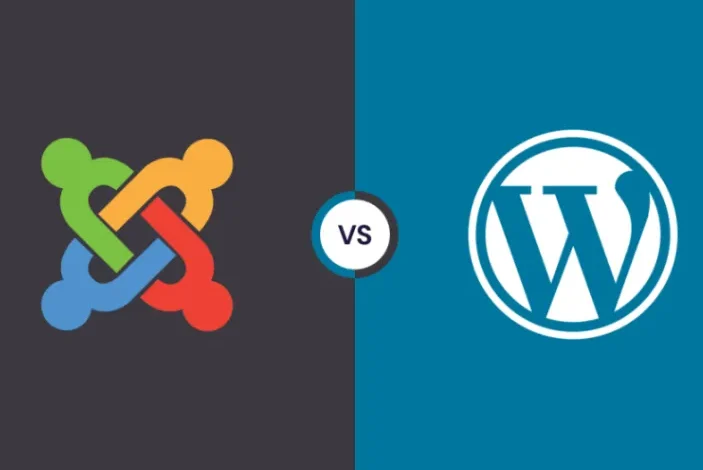Joomla vs WordPress: Which is the Better CMS for Your Website?

When it comes to building websites, choosing the right content management system (CMS) can be a bit overwhelming. Two of the most popular platforms for web development today are Joomla and WordPress. Both offer a range of tools and features to support different website needs, but which one is the best fit for you? In this article, we’ll compare Joomla and WordPress across various aspects such as functionality, user experience, customization options, security, and more, helping you make an informed decision about which CMS is ideal for your project.
What is WordPress?
Launched in 2003 by Matt Mullenweg and Mike Little, WordPress has grown to become one of the most widely used CMS platforms globally. It’s open-source, free to use, and written in PHP, with database support from MySQL or MariaDB. Initially designed as a blogging tool, WordPress has evolved into a powerful CMS capable of handling websites, blogs, mobile apps, and even online stores with the help of its extensive plugin ecosystem.
Advantages of WordPress
- User-Friendly: WordPress is well-known for its easy-to-use interface, making it ideal for beginners. The platform offers an intuitive dashboard and a wealth of tutorials and community support.
- Best for Blogging: With its specialized templates, WordPress remains the top choice for bloggers, offering seamless management of posts and pages.
- Vast Plugin & Theme Library: WordPress boasts a huge selection of plugins and themes, which are free and paid. These can be easily integrated and customized to suit any website.
- Affordable Development Costs: WordPress generally offers lower development costs compared to other CMS options, while still allowing high-quality results.
What is Joomla?
Joomla is another open-source CMS, originally developed in 2005 by the Joomla community and Open Source Matters Inc. Like WordPress, Joomla is built with PHP and supports various databases, including MySQL, PostgreSQL, and MS SQL. Known for its flexibility, Joomla is a good option for creating complex websites and web applications.
Advantages of Joomla
- Advanced User Management: Joomla provides more granular control over user access, allowing site administrators to manage permissions with greater precision.
- Flexibility: Joomla’s framework offers excellent flexibility for handling non-standard content types and complex websites.
- Built-in Multilingual Support: Joomla comes with native multilingual functionality, making it easier to create websites for diverse audiences without the need for additional plugins.
- Multi-Template Support: Joomla allows users to apply multiple templates across one website, providing more creative control over the layout and design.
Key Differences Between WordPress and Joomla
Extensions & Plugins
- WordPress Plugins: WordPress offers over 59,000 plugins, making it highly customizable for any website, from blogs to online stores. It also supports third-party tools like Yoast SEO for improving search engine visibility.
- Joomla Extensions: While Joomla has fewer extensions (around 8,000), they are well-organized and provide a good range of features. Joomla also comes with built-in multilingual support, eliminating the need for third-party plugins.
Pricing
- WordPress Costs: Building a WordPress website typically ranges from $100 to $3,000, depending on your needs. Costs include domain registration ($12/year), hosting ($3.95/month), and development or plugin fees.
- Joomla Costs: Joomla itself is free, but the total cost can be higher when factoring in development ($500-$5,000) and maintenance ($100-$1,000/month). Hosting costs range from $150 to $500 per year.
Ease of Use
- WordPress: Known for its user-friendly interface, WordPress is simple to set up and manage, even for those with limited technical knowledge. The platform’s dashboard is easy to navigate, making it ideal for beginners.
- Joomla: Joomla’s interface is more complex and requires some technical knowledge. Although it offers greater customization, the learning curve is steeper, and it may not be the best choice for beginners.
Design & Customization
- WordPress Themes: WordPress offers thousands of themes (free and premium) that can be customized with minimal effort. It also supports drag-and-drop tools, allowing users to create bespoke websites without coding.
- Joomla Templates: Joomla offers flexibility with multi-template support, but it doesn’t have as large a library of templates as WordPress. However, it can handle more complex content types and provides more advanced customization options.
SEO (Search Engine Optimization)
- WordPress SEO: WordPress is renowned for its SEO capabilities, largely due to plugins like Yoast SEO, which help users optimize their websites for search engines with minimal effort.
- Joomla SEO: Joomla is also SEO-friendly, offering features like search engine-friendly URLs. However, it requires more manual configuration, which can be challenging for non-technical users.
Security
- WordPress Security: Due to its popularity, WordPress is often targeted by cyber attackers. However, it offers a wide range of security plugins, such as Wordfence, to help protect sites. Regular updates also ensure that vulnerabilities are patched quickly.
- Joomla Security: Joomla is generally secure but can be vulnerable if third-party extensions are not properly maintained. Joomla also includes SSL support out of the box, which enhances security without the need for additional plugins.
Comparison Summary: WordPress vs. Joomla
| Feature | WordPress | Joomla |
|---|---|---|
| Security | Excellent with frequent updates | Good, but requires manual updates |
| SEO | Superior with Yoast SEO integration | Good, but requires manual setup |
| Ease of Use | Beginner-friendly | More complex, suited for developers |
| Pricing | Generally cheaper | Higher costs for development and hosting |
| Customization | Extensive plugin and theme library | Better for multi-template websites |
| Multilingual Support | Third-party plugin required | Built-in support |
| Market Share | Powers 40% of websites | Powers around 3% of websites |
Conclusion – Which One is Right for You?
The best CMS for your website depends on your needs. If you’re a beginner or want a simple, easy-to-manage website, WordPress is likely the better option. It’s perfect for bloggers and small to medium-sized businesses who need a cost-effective solution. On the other hand, if you have more technical expertise or need a highly customizable platform for complex websites, Joomla offers more flexibility and advanced features, albeit with a steeper learning curve.
In the end, both platforms have their strengths, and the decision comes down to your specific requirements. Happy website building!







